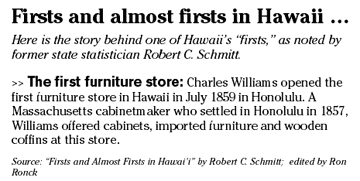|
Business Briefs
|

NATION
How to get a handle on your fuel expenses
The surge in crude oil and gasoline prices over the past year has been accompanied by an equally formidable budget pincher: rising interest rates. This veritable one-two punch is enough to make even the most fiscally prudent squeal. But there are steps to help minimize the burden. Consumer Credit Counseling Service of Atlanta has a few tips:
» Determine how much you spend monthly on gas. Use cash or a single credit card for fill-ups to help simplify this chore. Part of the budgetary battle is in knowing how much of your income is going to the oil companies.
» Use routes with less traffic, because the less stopping and starting, the less gas you'll burn.
» Combine trips and car pool. If you and a co-worker -- or two or three -- all live in the same suburb or neighborhood and head downtown each day to the same building at the same time, why take two or three cars?
» Check out your credit card rates. If you have a good payment history, many lenders will lower your rate on request. Many will not, but it can't hurt to ask them -- firmly and politely.
» Trim debts. Funnel more money to your credit card payments. With the Federal Reserve likely to keep raising rates, you're facing a higher debt service bill if you don't.
Worker morale seems to be falling
How's your morale at work?An annual "Employee Review" survey of more than 3,200 workers queried in June suggests it's down from a year ago. Less than half -- 40 percent -- called employee morale "good" or "excellent," down 4 percentage points from 2004, according to the poll by Randstad North America, the Atlanta-based subsidiary of Randstad Holding NV, the Dutch temporary staffing services company.
Even more striking, the number of employers who said morale was good or excellent fell from 70 percent in 2004 to 55 percent in 2005. Part of the reason might be the issue of loyalty: Nearly 60 percent of employees said they're loyal to their companies, but only 26 percent felt the company was loyal to them -- down from 41 percent in the previous two years.
Does your kid know credit basics?
Before your son or daughter heads off to college, the InCharge Institute of America Inc., a nonprofit group that specializes in credit counseling, has a few questions for you:
» Do you talk openly at home about finances, or did your child take a personal finance class in high school?
» Has your student created a monthly expenses budget?
» If the student has a credit or debit card, have you discussed spending limits?
» Do you know the card's APR?
» Have you discussed the negative effects of paying only the minimum balance?
» Have you discussed identity theft?
» Have you discussed the importance of an emergency cash fund?
If you answered yes to these, or to most, all should go relatively smoothly, from a financial perspective. If it's no, you might want to sit down with the collegian to have a long talk.
E-mail to Business Desk
[News] [Business] [Features] [Sports] [Editorial] [Do It Electric!]
[Classified Ads] [Search] [Subscribe] [Info] [Letter to Editor]
[Feedback]
